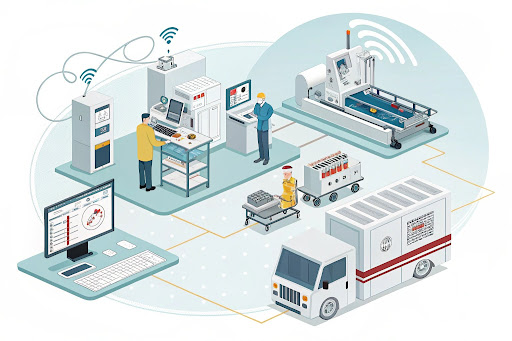Industry

Introduction to Industry Applications
Industry applications encompass a broad range of technologies, software, and methodologies that optimize industrial processes across multiple sectors. With Industry 4.0 and automation at the forefront, industries are leveraging cutting-edge solutions to enhance efficiency, reduce costs, and drive innovation.
Key Aspects of Industrial Applications
1. Industrial Automation and Process Control
- Industrial Automation is the backbone of modern manufacturing, allowing factories to optimize operations and improve production efficiency.
- Process Control Systems ensure stability, reduce human intervention, and improve overall safety.
- Key technologies include:
- Programmable Logic Controllers (PLCs)
- Supervisory Control and Data Acquisition (SCADA) systems
- Industrial IoT (IIoT) solutions
2. Software and Enterprise Systems in Industries
- Enterprise Resource Planning (ERP) and Supply Chain Management (SCM) solutions enhance coordination across various departments.
- Software tools like Integrated Development Environments (IDEs) facilitate software development for industrial applications.
- Industrial Applications Software:
- Manufacturing Execution Systems (MES)
- Product Lifecycle Management (PLM)
- Supply Chain Optimization Tools
3. Technologies Driving Industrial Innovation
- Artificial Intelligence (AI) and Machine Learning (ML) are revolutionizing the way factories operate by providing predictive analytics.
- Green Technologies are helping industries minimize their carbon footprint.
- Industrial Robots are being extensively used in automation and material handling.
Industry Applications Across Sectors
1. Manufacturing and Production Management
- Smart Factories integrating AI, IoT, and automation.
- Predictive Maintenance using sensor-based monitoring.
- Process Optimization through data analytics.
2. Logistics and Supply Chain Management
- Warehouse automation with robotic arms and conveyor systems.
- Logistics Optimization via real-time tracking and route planning.
- Inventory Control with smart tracking systems.
3. Energy Management and Sustainability
- Industrial Energy Consumption monitoring to improve efficiency.
- Green Technologies for reducing waste and emissions.
- Smart Grid Solutions for optimizing energy distribution.
4. Process Industries and Heavy Engineering
- Chemical and Petrochemical Processing leveraging PLC-based applications.
- Material Handling and automation-driven safety protocols.
- High-Tech Equipment Monitoring for real-time analysis.
The Role of Data Science in Industrial Applications
A Data Science Course in Lucknow can help professionals understand how big data analytics is transforming industrial applications, enabling:
- Process Optimization
- Predictive Maintenance
- Real-time Decision-Making
Key Takeaways:
- Industry 4.0 is transforming traditional industrial setups.
- Automation and AI are driving efficiency.
- Green technologies are paving the way for sustainable industrial solutions.
- A Data Science Course in Lucknow can equip professionals with the skills to analyze and optimize industrial processes.
Industry applications continue to evolve, integrating advanced technologies, software tools, and innovative strategies to improve efficiency and sustainability. The increasing use of automation, AI, and IoT in various sectors highlights the importance of digital transformation in modern industry.

